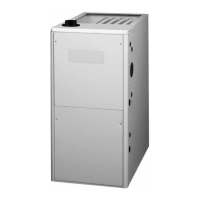26
1. Place thermometers in the return and supply air
stream as close to the furnace as possible. To avoid
false readings, the thermometer on the supply air side
must be shielded from direct radiation from the heat
position. Run the furnace for 10 to 15 minutes on
Table 4 before
taking any temperature readings. The temperature
rise is the difference between the supply and return
air temperatures.
temperature rise is not the correct value, choose another
CAUTION:
1. Remove the burner compartment door.
over immediately between all burners without lifting off,
curling, or floating. The flames should be blue, without
yellow tips.
3. After validating flame characteristics, change thermostat
setting to below room temperature.
5. Replace the burner compartment door.
Switch
NOTE: A properly functioning limit switch should turn off
opens, the inducer blower should run for 30 seconds and
the circulating air blower will run continuously
1. Check the blower door and verify that it is securely
mounted in place and that there is power to the furnace.
2. Block the return airflow to the furnace by installing a
return air, set the thermostat to a temperature below
room temperature, shut off the power to the furnace,
and replace the limit switch.
OPERATING SEQUENCE
24)
, 24) and32).
1. The thermostat calls for heat through the communication
cable.
2. The control checks the availability of the pressure
switches.
down for 5 minutes before retrying.
energizes the inducer and waits for the low
pressure switches to close. The low pressure
switches must close within 12 seconds.
4. The control energizes the igniter output for an adaptive
inputs after the flames have stabilized.
remains energized. The control goes to blower on delay.
7. The control energizes the blower on the selected speed
10 seconds after the gas valve opens. The gas valve
and inducer remain energized.
any of the low pressure switches are open, the
furnace will shut down.
high pressure switches are open, the furnace will
the furnace will shut off.
9. The circulating air blower will continue to run for the
thermostat handles cooling in two ways:
Ready air conditioners and heat pumps,
the thermostat communicates directly to the appliances
through the communications cable, turning on the
cooling appliance and furnace blower.
pumps/, the thermostat communicates to the furnace
through the communications cable. The furnace then
issues the call for cooling through the Y/Y2 or Y1 and

